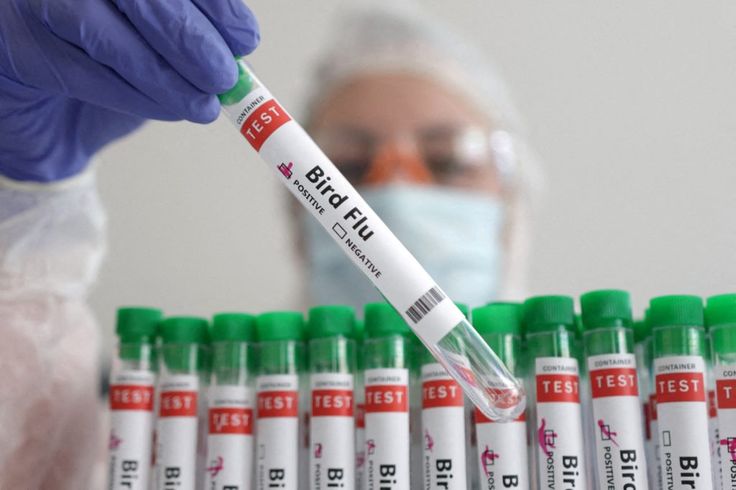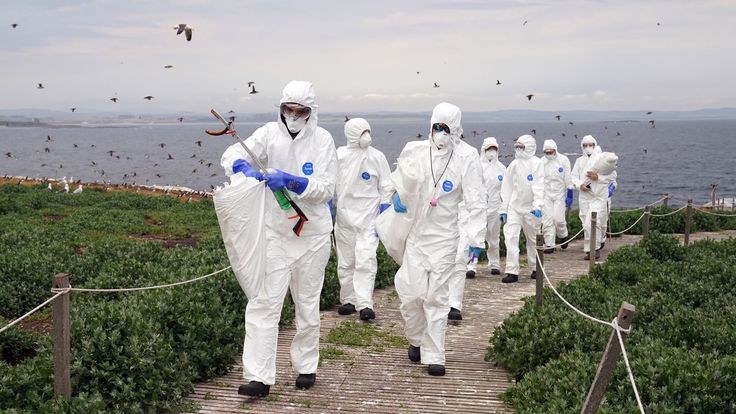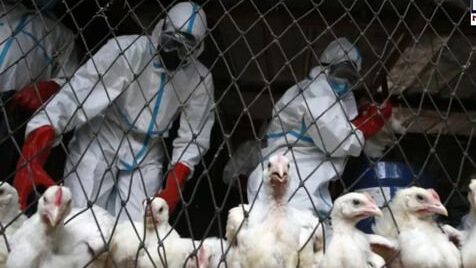
Bird flu, also called avian influenza, is a form of virus that particularly influences birds. However, in a few cases, it may spread to people and different animals. This flu may be very risky and has made humans unwell inside the past. In a few cases, it has even brought about demise.
Bird flu spreads in general amongst wild birds and farm birds like chickens and geese. But in rare cases where people come into contact with infected birds, they contract the virus. We must therefore understand what avian flu is, how it spreads, what its symptoms are, and how to prevent or treat it.
To keep you safe and aware, we can describe all of these facts in plain language through this document.
What is Bird Flu Virus Disease?
Bird flu is a disorder because of an epidemic known as the avian influenza virus. This virus by and large infects birds, especially wild birds like ducks and geese. However, it could additionally unfold to farm birds inclusive of chickens and turkeys.
Many specific strains of fowl flu viruses exist, but H5N1 is one of the most dangerous for humans. H5N1 spreads in no time amongst birds and may lead them to become very ill or maybe cause them to die. In a few uncommon instances, the virus can bounce from birds to human beings.
While fowl flu does not infect people as often as the regular flu, while it does, it is able to be very severe. People who catch chook flu may emerge as very ill and want medical care. Because of this, it is important to study hen flu and the way to stay secure.

How Does Bird Flu Virus Spread?
Bird flu spreads mostly among birds, especially farm birds like chickens and ducks, as well as wild birds. However, in some cases, the virus can spread to humans too. There are several ways people can catch bird flu, including the following:
Direct Contact with Infected Birds
A person can get bird flu if they touch a sick bird, its feathers, saliva, or droppings. Farmers, bird handlers, or people who visit live bird markets are at a higher risk because they are around birds more often.
Breathing in the Bird Flu Virus (Airborne Particles)
The bird flu virus can be in the air, especially in places where there are many birds. A person could get infected by breathing in dust or tiny particles from bird droppings. This can happen in poultry farms, markets, or areas with many wild birds.
Touching Contaminated Surfaces
The virus can live on surfaces such as bird cages, farm equipment, clothing, and even human hands. If one touches these surfaces and then touches his or her mouth, nose, or eyes without washing his or her hands, he or she may become infected.
Eating Undercooked Poultry or Eggs
Eating undercooked chicken, duck, or eggs can infect an individual with the virus. Cooking eggs and chicken thoroughly before consumption is essential, as high temperatures kill the virus.
Symptoms of Bird Flu Virus in Humans
If a person gets bird flu, they may feel very sick. The symptoms can appear within a few days after infection. Common symptoms include:
- High fever
- Cough
- Sore throat
- Runny or stuffy nose
- Muscle pain
- Headache
- Shortness of breath
- Diarrhea
- Feeling very tired
In severe cases, bird flu can cause pneumonia, organ failure, or even death.

How is Bird Flu Virus Disease Diagnosed?
If a physician suspects that someone has a bird flu, they will perform individual tests to verify the virus. Because bird flu can be quite severe, it is crucial to determine whether or not someone has the earliest. Physicians employ various methods to diagnose bird flu, such as the following:
Swab Test from the Nose or Throat
One of the most used methods for screening bird flu is by getting a broom from within one person’s nose or throat. The physician uses a gentle cotton broom to obtain a sample, which is then sent to a lab for a test of the virus. The test ensures whether an individual has a bird flu.
Blood Test to Check for Infection
A doctor may also take a small sample of blood to test if the body is fighting the virus. If a person has bird flu, their immune system will try to fight it, and this can be seen in the blood test.
Chest X-ray to Look for Lung Problems
If the physician suspects that the individual has pneumonia, a severe infection of the lungs, they can perform a chest X-ray. This allows them to determine if the virus damages the lungs and if the individual requires special treatment.
Treatment for Bird Flu
There is no exact cure for bird flu, but doctors use different treatments to help people feel better and recover. The sooner treatment starts, the better the chances of getting well. Here are some common ways doctors treat bird flu:
Antiviral Medicines to Fight the Bird Flu Virus
Doctors can prescribe antiviral drugs like oseltamivir (Tamiflu) or zanamivir (Relenza) to help the body fight the virus. They work best when taken early, usually within the first two days of getting sick. They can help reduce symptoms and prevent complications.
Medicines to Reduce Fever and Pain
Individuals suffering from bird flu usually have a fever, body pains, and headaches. Physicians can recommend drugs such as acetaminophen (Tylenol) or ibuprofen to reduce the fever and alleviate pain. The drugs enable the individual to feel comfortable while his body battles against the virus.
Getting Plenty of Rest and Drinking Fluids
Sleeping is also very important because it enables the body to heal. Drinking fluids in large quantities like water, juice, or soup prevents dehydration and keeps the body strong. Fluids help to loosen mucus as well as make breathing easier.
Hospital Care for Severe Cases
If someone gets extremely ill, they might have to be hospitalized for special treatment. Some individuals with bird flu have difficulty breathing and will require oxygen or a ventilator to provide them with sufficient air. Hospital doctors will monitor their condition closely and provide them with the treatment they require.
How to Prevent Bird Flu
The safest way to avoid bird flu is to simply take precautions to prevent infection. As the virus is transmitted mainly from birds, one should take precautions while coming in contact with birds, eggs, and poultry items. Below are some critical steps to prevent bird flu:
Avoid Contact with Sick or Dead Birds
One of the simplest ways of being safe is to avoid contact with birds that appear sick or have died. Wild birds, farm birds, and even domestic birds can transmit the virus. If you spot a bird that appears ill, do not handle it. If you handle birds, always take precautions to safeguard yourself.
Wash Hands Often to Kill Germs
Hand washing with soap and water is the best method to prevent infections, such as bird flu. Wash hands properly after touching birds, eggs, or raw chicken for a period of at least 20 seconds. In the absence of them, sanitize your hands to kill germs.
Cook Poultry and Eggs Properly
Eating raw or undercooked eggs and chicken raises the risk of getting bird flu. To be safe, cook the chicken to 165°F (75°C) or more to kill any viruses. Hard-cook the eggs so that yolk and white are hard. Do not consume raw eggs or dishes with uncooked eggs.
Wear Protective Gear When Handling Birds
People who work with birds, such as farmers, poultry workers, and veterinarians, should wear protective gear like gloves, masks, and special clothing. This helps reduce the risk of breathing in the virus or getting it on their skin. After working with birds, they should remove and clean their gear properly.
Get a Flu Shot to Reduce Risk
While the standard flu vaccine will not protect against bird flu, it can decrease the chances of falling ill with other flu viruses. Having both the regular flu and bird flu at the same time can increase the severity of the illness. Vaccination will also stop the combination of flu viruses to form new and possibly more lethal viruses.
Is There a Bird Flu Vaccine?
Researchers are working on developing a bird flu vaccine, but at the moment there is none for the masses. Since bird flu is not prevalent in humans, a vaccine is not usually given like the usual flu jab.
But researchers are studying different types of bird flu viruses in order to develop a vaccine that will prevent people in case there is an outbreak. There are a few bird flu vaccines in reserve in some nations in the event of a large outbreak.
They would be given to those who are at risk, such as poultry workers, farmers, and healthcare workers who could be exposed to infected birds. Scientists continue to test and perfect these vaccines so they can be used if bird flu starts to spread more among humans in the future.
What to Do if There is a Bird Flu Virus Outbreak?
If there is a bird flu outbreak in your area, it is important to take extra precautions to stay safe. Bird flu can spread quickly among birds and, in rare cases, infect humans. To protect yourself and others, follow these important steps:
Stay Away from Live Bird Markets and Farms
In case of an outbreak, avoid visiting areas where there are many birds, such as live bird markets, chicken farms, and pet bird shops. Such places have a greater chance of having infected birds, which would transmit the disease to those who come near.
Do Not Touch Wild Birds or Stray Animals
Wild birds, such as ducks, pigeons, and crows, might be infected with the bird flu virus even when they appear healthy. Avoid feeding or handling wild birds, and stray animals that have been in contact with infected birds.
Follow Government Health Warnings and Advice
During an outbreak, government representatives and medical professionals will provide information and safety precautions. Pay attention to their suggestions regarding travel restrictions, hygiene, and food safety. To lower the risk of infection, heed their advice to stay indoors or stay away from specific locations.
See a Doctor if You Feel Sick
If you experience symptoms of flu, including fever, cough, sore throat, or breathing difficulty, then visit a doctor immediately. Inform the doctor if you are around birds or in a region where bird flu cases have been detected. Early treatment may avoid severe complications and avoid the disease worsening.

Conclusion
Bird flu is a serious illness that affects most birds but occasionally affects people. Bird flu is transmitted through direct contact with infected birds, touching contaminated objects, or consuming underrated poultry. Bird flu is not frequent among people, but it can be extremely fatal.
Symptoms like fever, cough and difficulty in breathing are dangerous. Physicians treat bird flu with antiviral drugs, pain medications, comfort and fluids. In severe cases, hospitalization is required to support breathing problems.
As bird flu is not an often administered vaccine, the best method of staying safe is to be careful. Hand washing, not touching birds that are ill, and cooking poultry and eggs properly can protect us. If we adhere to these security phases, we can escape the threat of bird flu and protect our communities and ourselves.
FAQs
What is bird flu?
Bird flu, also called avian influenza, is a viral disease that mostly infects birds but sometimes jumps to humans and other animals. One of the most deadly forms for people is the H5N1 strain.
What are the symptoms of bird flu in humans?
Common symptoms include:
- High fever
- Cough and sore throat
- Runny nose
- Muscle pain and headache
- Shortness of breath
- Diarrhea
Can bird flu spread from person to person?
Bird flu rarely spreads between humans. However, in some cases, close contact with an infected person may lead to transmission.
Should I stop eating poultry products during a bird flu virus outbreak?
No, so long as the poultry and eggs are cooked through to a safe temperature, they are safe to consume. Refrain from eating raw or undercooked poultry items.

